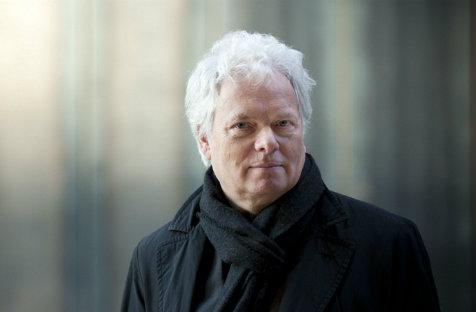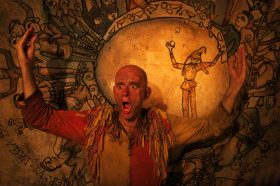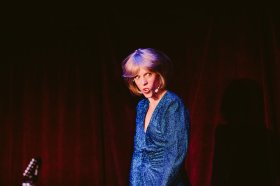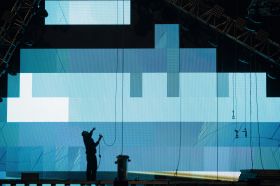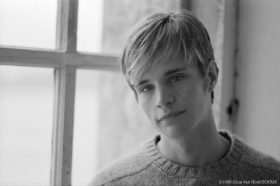Composer and director Heiner Goebbels is something of a rock star in Germany. His shows often tour for years – Eraritjaritjaka has only now arrived in Sydney, eight years after it was first performed at Théâtre de Vidy-Lausanne in 2004. The piece has been well received here, though not without some puzzlement. Goebbels’s conversation with Robyn Archer at the Theatre Royal on Saturday 12 January provided some insight into his abstruse work. Archer suggested that his works are long lived because of their ageless simplicity; Goebbels replied that it’s because they’re unfashionable. Either way, they capture the imagination.
Goebbels studied sociology, moved on to music and then began working as a composer for the theatre. His beef with conventional theatre was the primacy of the text at the top of a hierarchy of elements. His frustrations with the theatre led him to start making audio plays in the mid 80s, which allowed him splice spoken text in a precise way to fit in with his music. During this time he worked with a number of Heiner Müller’s texts, such as The Liberation of Prometheus and Waste Shore. It was later in his work as a stage director that he began to work with text as but one of many voices in a score and thus create what he calls a theatre of polyphony.
Eraritjaritjaka is an arrangement of the repertoire of the individual members of the Amsterdam based Mondriaan string quartet and the text from the notebooks of Bulgarian writer, Elias Canetti. Goebbels spoke of being attracted to theatre as a form of cultural preservation – Canetti’s notes may have otherwise gone unnoticed. This explains the play’s subtitle of ‘Museum of Phrases’, which speaks to Goebbels’ notion that the theatre is a museum for our senses. The word ‘Eraritjaritjaka’ is derived from the Arunta language, and has been translated as a longing for something lost. When asked by Archer if something in particular has been lost in our culture, Goebbels replied in the affirmative: our capacity for imagination. His remedy is to create open-ended theatre that provokes questioning rather than providing conclusions. In particular he mentions the importance of separating sound and visuals so as to provoke the imagination.
To this end Goebbels labels the unity of forms such as cinema and television as dictatorial; they dictate what the audience response should be. He mentioned that part of his attraction to Cannetti’s work is its anti-fascistic stance, which he tries to bring to his theatre.
Goebbels is set to continue directing more rarefied work, with his production of American composer, Harry Partch’s Delusion of the Fury set to have its European premiere at the German Ruhrtriennale in August this year. With any luck it might grace an Australian stage within the decade.
Heiner Goebbels in conversation with Robyn Archer
Theatre Royal, MLC Centre, Sydney
12 January
Sydney Festival 2013
www.sydneyfestival.org.au
5 – 27 January
